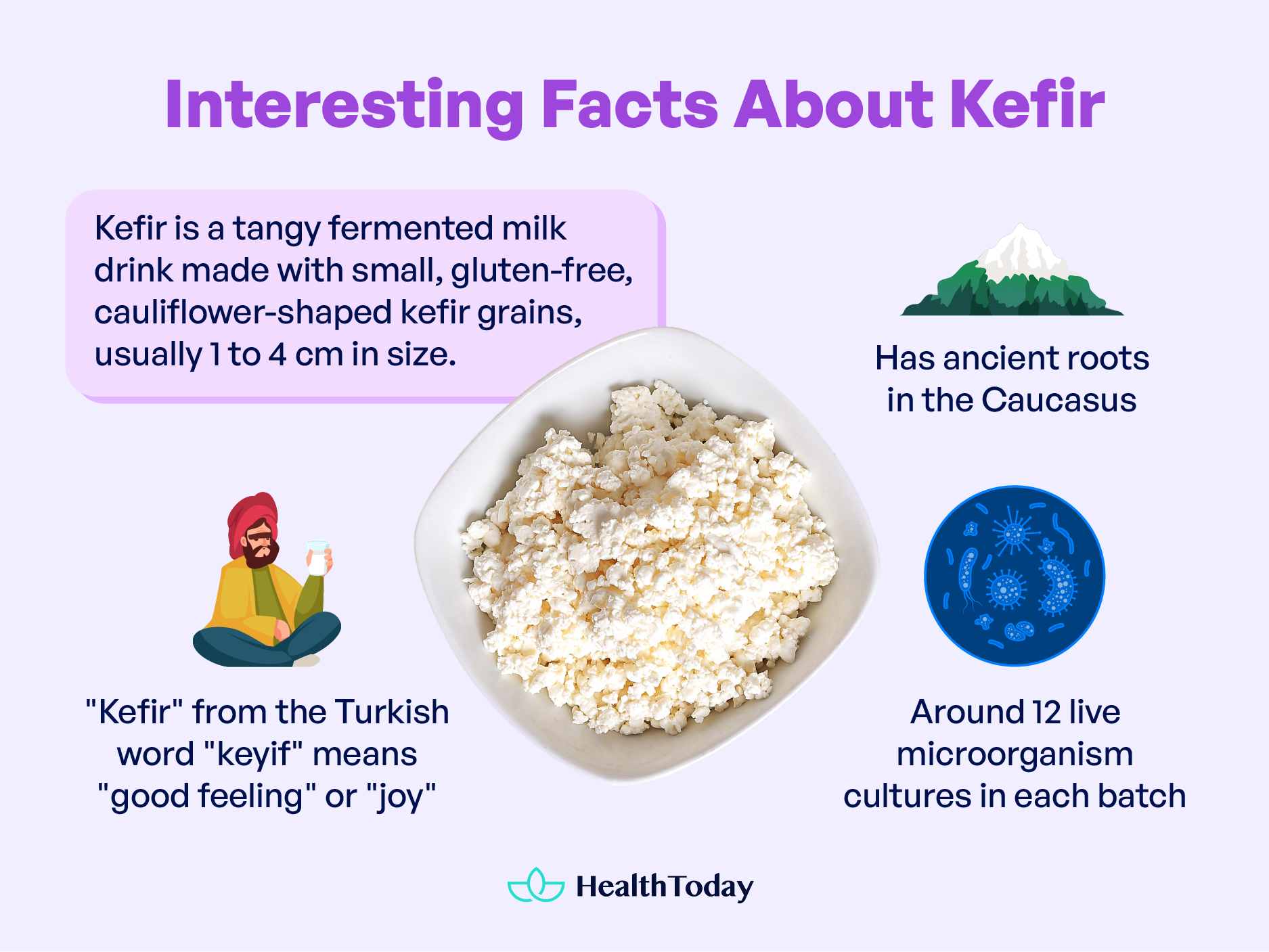Table of Contents
Is kefir good for an upset stomach? Kefir is excellent at soothing an upset stomach caused by pain, indigestion, or acid reflux. It is even said to have anti-cancer properties, lowering blood cholesterol, improving wound healing, and alleviating asthma or allergies (1). However, its microbe components might pose issues for sensitive people.
This article centers on amplifying kefir benefits for concerns like diarrhea, constipation, and bloating. We’ll also debunk some kefir myths and delve into why kefir outshines yogurt in promoting gut health.
Let’s find out if kefir works for you and find ways to get the most out of it.

What is kefir?
Kefir is a tangy fermented milk drink made with small, gluten-free, cauliflower-shaped kefir grains, usually 1 to 4 cm in size (2). These grains contain a mix of bacteria and yeast known as “probiotics.” The key bacteria are lactic acid bacteria, mainly from Lactobacillus groups, known for promoting gut health (1, 3, 4).
Milk is pasteurized to remove its natural microbes before adding kefir grains. When fermentation happens, kefir grains multiply, then you can produce more batches (5, 6).
Interesting facts about kefir
Kefir has ancient roots in the Caucasus. Nomads called it “kefir,” possibly from the Turkish word “keyif,” which means “good feeling” or “joy.” This name not only suggests it’s a pleasant drink but also hints at a positive impact on your stomach, potentially enhancing a good mood through the gut-brain axis (1, 2).
Despite its long history, this yogurt-like drink has gained popularity in recent years (5, 7).
How kefir works for your body
Kefir has been linked to improving bone, digestive, heart, skin, and immune health (1, 2). With around 12 live cultures in each batch, kefir fosters a community of good microorganisms in your body, minimizing harmful ones (1, 3, 8).
As milk is fermented with kefir grains, it produces helpful compounds such as enzymes, vitamins, minerals, bioactive peptides, antioxidants, organic acids, and prebiotics like kefiran. These compounds show effects such as reducing blood pressure, fighting infections, easing inflammation, and lowering cholesterol (5, 6, 9).
While there is promising evidence, more studies are needed to confirm these health effects on humans (5).
Is kefir good for an upset stomach?
“Upset stomach” refers to a condition when you feel uncomfortable in the stomach, often accompanied by symptoms such as nausea, bloating, heartburn, constipation, diarrhea, or discomfort (10).
An upset stomach is often due to an imbalance in the gut microbiomes—the microbes community in your gut. Kefir, with its good microbes, can fix this by restoring balance, neutralizing irritants, and providing relief from discomfort (2, 5, 11).
Probiotics, including those found in kefir, can also support treating and preventing gastrointestinal conditions (1, 2, 12, 13):
- Irritable bowel syndrome (IBS): can cause pain, gas, bloating, constipation, and diarrhea.
- Inflammatory bowel disease (IBD), including gastric ulcers and Crohn’s disease.
- Helicobacter pylori (H. pylori) infection is a risk factor for stomach cancer.
- Clostridium difficile (C. difficile) colitis, which can be life-threatening.
- Diarrhea, including infectious diarrhea, antibiotic-associated diarrhea, infant’s diarrhea, and traveler’s diarrhea
- Gut inflammation (gastroenteritis), including severe conditions like pouchitis (inflammation of the ileum pouch of people who underwent colon surgery) and necrotizing enterocolitis (inflammation and death of cells in the intestines, usually happens only in preterm neonates (baby just born). However, most research on using kefir for this condition only involves animals and test tubes.) (14).
A study found that people who used probiotics could lower the risk of developing these diseases by 27% compared to those who did not (12).

Menstrual cramps
Kefir is rich in magnesium and calcium, which are vital for muscle movement. Thus, drinking kefir may help. Some people may report benefits of relieving muscle cramps after exercising (8, 15, 16).
Moreover, kefir contains tryptophan, magnesium, and gamma-aminobutyric acid (GABA), which can relax your brain and relieve tension (8). However, more studies with humans are needed to confirm this effect (17, 18).
Lactose intolerance
Lactose intolerance is when people struggle to break down and digest lactose, resulting in stomach pain, bloating, and diarrhea (19).
In kefir, lactic acid bacteria consume lactose in milk, turning it into tangy lactic acid (5). This means kefir has less lactose than regular milk, making it easier on the stomach (20).
However, studies are limited, and milk-based kefir still contains lactose. So, if you’re lactose intolerant, you can go for water kefir instead (21, 22).
Gut inflammation
Stomach issues, including serious cases, often start with inflammation. People with an inflamed gut have different microbiomes from those without — meaning they have more harmful microbes or an imbalanced microbial environment (23).
Drink some kefir, and you will get beneficial microbes (probiotics) to battle the harmful ones. Among 61 species of microbes, you can find in kefir, many showed promising preventions for toxins and damage caused by (1, 24, 25, 26):
- H. pylori, a major cause of peptic ulcers, chronic gastritis, and cancer (27)
- B. cereus, S. aureus, C. perfringens, and Salmonella from contaminated food, causing food poisoning
- E. coli, especially the strain O157:H7 can cause kidney failure (28)
- L. monocytogenes, which can lead to miscarriage, premature birth, or severe illness in newborns
How can probiotics do this? They can release bacteriocins— natural antibiotics to kill harmful microbes (1). Probiotics in kefir can also boost your immune system by increasing immune cells and supporting anti-inflammatory proteins (14, 29, 30).
Apart from the probiotics in kefir, there are by-products of their metabolism, including Kefiran, lactic acid, essential amino acids, peptides, biotin, and folate, which show strong anti-inflammatory effects, support energy balance and boost our immune system. Besides, the peptides and polysaccharides in kefir can induce cancer cell death (apoptosis) in cell models. Thus, further research is needed (1, 9, 31, 32, 33).
Irritable bowel syndrome (IBS)
Irritable bowel syndrome (IBS) is a disorder where your stomach and intestines function improperly, leading to belly pain, bloating, gas, diarrhea, or constipation (34). It affects about one in ten people globally, but many avoid talking about it due to the embarrassing symptoms (35, 36).
In addressing IBS, kefir can be a potential natural remedy. It promotes balance in the immune system and gut microbiome, thus actively improving digestion efficiency. A randomized clinical trial reduces excessive gas, easing symptoms like bloating, and decreases inflammation as measured by erythrocyte sedimentation rate (ESR) and C-reactive protein (CRP), which are both inflammatory markers (5, 37).
Kefir has also been shown to improve stool consistency and bowel satisfaction, thus relieving constipation and diarrhea (8, 38, 39, 40).
Heartburn and acid reflux
A recent review found that probiotics could reduce acid reflux episodes and improve heartburn and other indigestion symptoms, like nausea, belly pain, and bloating (39).
However, evidence validating kefir’s benefits for acid reflux is limited, and kefir is acidic with a pH of 2–3. So, more high-quality research is needed (31, 9, 41).
When should you see a doctor for your upset stomach?
If you constantly have stomach problems for more than 48 hours, seek advice from your doctor. The doctor can rule out severe conditions like Crohn’s disease, food allergies, or other issues (10, 42).
Your doctor will help you with creating a personalized treatment plan. Kefir can be a pocket-friendly way to bring in some great health benefits, but will kefir cure you of all the stomach problems? Perhaps not, as ongoing studies are still unraveling its full potential, so you should not use kefir as a sole fix for any digestive problem and not visit your doctor.
It’s important to note that people with IBS may face difficulties digesting kefir and other milk products. The optimal kefir amount for IBS is still uncertain, so it’s best to consult your doctor to see if kefir fits your condition (3, 43).
Are you drinking kefir the wrong way?
When choosing kefir for your stomach health, it’s important to select a reliable brand with live cultures because not all kefir products are created equal. Also, watch when and how much you enjoy kefir— small changes can make a big difference.
Which type of kefir is good for an upset stomach?
Kefir can be made with different milk bases such as goat, buffalo, sheep, camel, or cow. If you have IBS or lactose intolerance, non-dairy kefir alternatives made from coconut, rice, soy milk, or water and fruit juices are great choices for you (9).
Note that kefir typically has an alcohol content of 0.5%–2%. Despite its low alcoholic content, those who are sensitive to alcohol and children should choose kefir brands labeled “alcohol-free” (5).
Companies sometimes use sugars and molasses to enhance the taste of kefir, but this sweetened version can worsen stomach issues. Therefore, you should choose plain, unsweetened kefir or get creative by making your kefir at home with fruit or honey (9, 44).
Homemade kefir is the best for an upset stomach, as store-bought kefirs often lack probiotic counts due to quick fermentation. Give your homemade kefir an extra 48 hours to ferment to enhance its probiotic content (6). Homemade kefir is also sugar-free and budget-friendly because you just need to change the milk to make a new batch.
Here’s a tip: pay attention to probiotic strains. Different strains are better at tackling specific digestive issues (1, 3, 45):
- Reducing cholesterol: Kluyveromyces marxianus, Bifidobacterium bifidum, Streptococcus thermophilus (46, 47)
- Treating diarrhea: Saccharomyces boulardii (for C. difficile-associated diarrhea), Lactobacillus acidophilus (23)
- Relieving constipation: Bifidobacterium lactis, Bifidobacterium longum
- Fighting infections (producing bacteriocins): Lactobacillus kefiranofaciens, Lactobacillus paracasei subsp. tolerans (1, 48)
- Improving mood: Lactobacillus reuteri, Bifidobacterium longum 1714 (49)
- Relieving acid reflux not treated well with drugs (PPIs; proton-pump inhibitors): Bifidobacterium bifidum YIT 10347 (50), Bifidobacterium lactis HN019, Lactobacillus gasseri LG21 (39)
- Enhancing mucosal immune system: Lactobacillus casei Shirota, Lactobacillus rhamnosus HN001, Lactobacillus acidophilus HN017, Bifidobacterium lactis HN019 (47)
- Improving lactose intolerance: Lactobacillus johnsonii La1, Lactobacillus salivarius, Lactobacillus acidophilus LB (47)
You should carefully check the strains in the kefir you buy from the store, you would know whether they match your needs. However, some key strains can’t be found in commercial kefir. In this case, get a probiotic capsule for better control over what goes into your homemade kefir.
It’s crucial to distinguish between species and strains. The Lactobacillus rhamnosus GG (LGG) strain is great for treating diarrhea, way better than other strains of the species Lactobacillus rhamnosus. Traditional kefir has some Lactobacillus rhamnosus strains, but they are not LGG. LGG is found in commercial capsules (23, 47, 51).
It is also vital to check different brands. Even if different brands use the same strain, their products may vary significantly. This is because of the different additives, composition, and livelihood of the probiotics during the fermentation process.
How much is too much?
Currently, there isn’t solid scientific data to recommend a safe amount of kefir, but it is generally safe (3, 7, 9). In some studies, participants can drink about 400–600 mL of kefir daily without side effects (37, 52).
If you have diabetes or are on a low-carb diet, it’s a good idea to limit store-bought kefir. A cup can contain around 11–13 grams of carbs, including about 11 grams of sugar, 22% of the recommended daily value (22, 53).
A cup of kefir has 316 grams of calcium (22). The recommended daily calcium intake varies by country but is usually 500 mg to 1200 mg (54).
When should you drink kefir?
Having kefir in the morning or before your first meal can fill your gut with good microbes for the day. But, there’s concern that the stomach acid produced when you’re hungry might harm the good kefir bacteria. Everyone’s experience with kefir differs, so think about what works best for you.
There are a few ways that you can get creative with kefir: Blend it into smoothies or dips for a tangy flavor and creamy texture with extra probiotics. You can also swap it for sour cream or mayonnaise in salads—less fat and more nutrition.
However, avoid using metal containers or spoons when making or consuming kefir, as metal can react with live cultures (55, 56).
Can kefir be harmful?
Probiotics can cause changes in bowel movements and indigestion. Yet, these issues are more common with probiotic supplements, which have a much higher concentration of probiotics than fermented drinks like kefir (23, 57).
Some people might experience some gas and bloating when consuming probiotic-rich kefir. Your gut needs time to adapt and host new probiotic strains, so you can start with a small amount and increase daily and see how your body reacts. Be patient for the significant benefits to kick in (8, 37).
Some probiotic products have been found to contain microorganisms not listed on the label, posing potentially serious health risks (3).
Homemade kefir production can pose risks of contamination and spoilage. Be sure to practice good hygiene during fermenting and storing kefir (2).

People with specific existing conditions, as follows, should be cautious:
- Pregnancy and breastfeeding: There’s not enough evidence that drinking kefir is safe during these times, so it’s better to avoid it.
- Premature infants: Severe probiotic infections have been reported on a very rare basis—when babies are severely immunocompromised or very preterm, prompting an FDA warning (3).
- Lactose intolerance: You can create kefir without dairy using sweet liquids, providing similar health benefits (2, 9).
- Weakened immune system: People with AIDS may be more susceptible to infections from the live cultures in kefir, even if the risk is low (23, 58).
- People taking immunosuppressants: If you’re taking drugs for cancer or organ transplants, avoid kefir as its Lactobacillus bacteria can cause sepsis (58, 59). Common immunosuppressant drugs include prednisone, basiliximab, mycophenolate, muromonab-CD3, corticosteroids, cyclosporine, sirolimus, tacrolimus, azathioprine, mycophenolate mofetil, everolimus, rituximab, and alemtuzumab (60).
- People taking Disulfiram: Disulfiram (Antabuse®) is a drug for alcohol dependence. Even a small amount of alcohol in mouthwash or food can lead to strong reactions like nausea, vomiting, headache, flushing, sweating, and chest pain. These reactions can last for an hour or longer. It’s best to avoid alcohol, including kefir, while using Disulfiram (61).
Kefir vs. yogurt for your health
Why does kefir taste tangy like yogurt? Both have lactic acid bacteria that convert milk’s lactose into lactic acid. However, kefir surpasses yogurt in promoting gut health.
Yogurt usually contains Lactobacillus and Bifidobacterium bacteria and no fungus. Kefir has these and more beneficial bacteria not found in yogurt, like Leuconostoc, Streptococcus, Pediococcus, and Acetobacter species. Kefir also includes friendly fungal species such as Saccharomyces and Torula kefir (1). In a study, 158 strains were isolated from different kefir grains (21).
Yeasts play a crucial role in kefir. For instance, the strain K. marxianus B0399 supports the gut immune system, aiding bacteria survival in the stomach and improving their attachment to intestinal cells (46). Otherwise, certain bacteria strains in yogurt may be destroyed by stomach acid before benefiting our gut. Cancer cells can survive by evading the immune system, but probiotics can help strengthen it, killing cancer cells. An in vitro (using cell lines) study discovered that kefir extract decreased human breast cancer cells by 56%, whereas yogurt extract only reduced them by 14% (62, 63, 64).
Is kefir good for an inflamed stomach?
Can kefir make reflux worse?
The impact is different for each person. Kefir can aid digestion and reduce acid reflux symptoms, but the evidence is limited (39). Kefir is acidic, so when consumed excessively, it might worsen reflux. If you have acid reflux, try unsweetened, low-fat, or fat-free kefir and introduce it gradually to your diet (9, 41).
Is kefir OK with gastritis?
Kefir is good for fighting inflammation, including the inflammation of the stomach lining (gastritis). However, as milk-based kefir is acidic, it might increase stomach acid and worsen gastritis symptoms. So, start with a small amount of kefir to let your body adjust to the probiotics and see how you feel (35).
Does kefir contain alcohol?
Summary
An upset stomach, with pain, bloating, and heartburn, often connects to an unhealthy gut. Kefir stands out as a natural remedy for an upset stomach, as this fermented drink is a whole food source of probiotics—it contains about 61 types of bacteria and yeasts.
Even store-bought kefirs offer more benefits than regular yogurt. However, these commercial products often have added sugar and only about 12 live cultures. It’s better to ferment kefir at home to get specific strains and enjoy its full benefits.
Kefir isn’t a cure-all or a replacement for traditional treatments, but including it in your daily diet can support gut health and prevent digestive issues.

















Comments
0